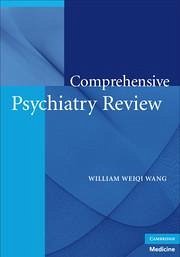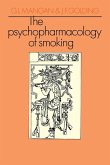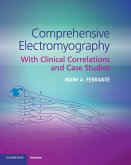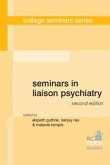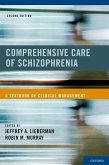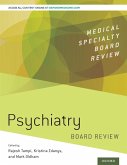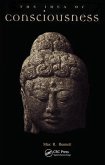William Weiqi Wang
Comprehensive Psychiatry Review
William Weiqi Wang
Comprehensive Psychiatry Review
- Broschiertes Buch
- Merkliste
- Auf die Merkliste
- Bewerten Bewerten
- Teilen
- Produkt teilen
- Produkterinnerung
- Produkterinnerung
This is a concise, outline-oriented review by Dr William Weiqi Wang for both the written and oral psychiatry boards, supplemented with case studies.
Andere Kunden interessierten sich auch für
![The Psychopharmacology of Smoking The Psychopharmacology of Smoking]() ManganThe Psychopharmacology of Smoking44,99 €
ManganThe Psychopharmacology of Smoking44,99 €![Comprehensive Electromyography Comprehensive Electromyography]() Mark A. FerranteComprehensive Electromyography96,99 €
Mark A. FerranteComprehensive Electromyography96,99 €![Seminars in Liaison Psychiatry Seminars in Liaison Psychiatry]() Seminars in Liaison Psychiatry45,99 €
Seminars in Liaison Psychiatry45,99 €![Monographie Du Pemphigus, Ou, Traité De La Maladie Vésiculaire Monographie Du Pemphigus, Ou, Traité De La Maladie Vésiculaire]() Stanislas GilibertMonographie Du Pemphigus, Ou, Traité De La Maladie Vésiculaire26,99 €
Stanislas GilibertMonographie Du Pemphigus, Ou, Traité De La Maladie Vésiculaire26,99 €![Comprehensive Care of Schizophrenia Comprehensive Care of Schizophrenia]() Comprehensive Care of Schizophrenia162,99 €
Comprehensive Care of Schizophrenia162,99 €![Psychiatry Board Review Psychiatry Board Review]() Psychiatry Board Review166,99 €
Psychiatry Board Review166,99 €![Idea of Consciousness Idea of Consciousness]() Max R BennettIdea of Consciousness78,99 €
Max R BennettIdea of Consciousness78,99 €-
-
-
This is a concise, outline-oriented review by Dr William Weiqi Wang for both the written and oral psychiatry boards, supplemented with case studies.
Hinweis: Dieser Artikel kann nur an eine deutsche Lieferadresse ausgeliefert werden.
Hinweis: Dieser Artikel kann nur an eine deutsche Lieferadresse ausgeliefert werden.
Produktdetails
- Produktdetails
- Verlag: Cambridge University Press
- Seitenzahl: 478
- Erscheinungstermin: 17. August 2009
- Englisch
- Abmessung: 251mm x 175mm x 25mm
- Gewicht: 998g
- ISBN-13: 9780521106450
- ISBN-10: 0521106451
- Artikelnr.: 27352056
- Herstellerkennzeichnung
- Libri GmbH
- Europaallee 1
- 36244 Bad Hersfeld
- gpsr@libri.de
- Verlag: Cambridge University Press
- Seitenzahl: 478
- Erscheinungstermin: 17. August 2009
- Englisch
- Abmessung: 251mm x 175mm x 25mm
- Gewicht: 998g
- ISBN-13: 9780521106450
- ISBN-10: 0521106451
- Artikelnr.: 27352056
- Herstellerkennzeichnung
- Libri GmbH
- Europaallee 1
- 36244 Bad Hersfeld
- gpsr@libri.de
William Weiqi Wang, MD, PhD, is an attending psychiatrist at SSM St. Joseph Health Center, an affiliate faculty member at St. Louis University, and Director of Medical Education at the Olivette Institute, St. Louis, Missouri.
Part I. Intellectual Foundation of Psychiatry: 1. Functional neuroanatomy
2. Neurochemistry
3. Neurophysiology
4. Child and adolescent development
5. Psychosocial theories
Part II. Evaluation and Measurement: 6. Evaluation of signs and symptoms
7. Classification and diagnosis
8. Psychometrics
9. Biostatistics
Part III. Psychiatric Disorders: 10. Cognitive disorders
11. Additions: general consideration
12. Addictions: alcohol-related disorders
13. Addictions: non-alcoholic substance related disorders
14. Psychotic disorders
15. Mood disorders
16. Anxiety disorders
17. Somatoform disorders
18. Dissociative disorders
19. Sexual and gender identity disorders
20. Eating disorders
21. Sleep disorders
22. Factitious disorder and malingering
23. Personality disorders
24. Child and adolescent psychiatric disorders
25. Psychosomatic disorders and consultation-liaison psychiatry
Part IV. Psychiatric Therapeutics: 26. Psychosocial therapy
27. Antipsychotics
28. Lithium and mood stabilizing anticonvulsants
29. Antidepressants
30. Anxielytics and hypnotics
31. Pharmacotherapy for substance related conditions
32. Cognitive enhancers
33. Stimulants
34. Drug interactions
35. Evaluation and treatment for adverse effects
36. Electroconvulsive therapy, brain stimulation therapies, and other novel treatments
Part V. Neuropsychiatry and Relevant Neurologic Conditions: 37. Congenital neuropsychiatric disorders
38. Infections of nervous system
39. Seizure disorders
40. Strokes and TIAs
41. Brain tumors and injuries
42. Headache
43. Spinal cord anatomy and related conditions
44. Movement disorders
45. Language impairment
46. Neuromuscular disorders and peripheral nerve disorders
Part VI. Special Topics: 47. Suicide and violence
48. Abuse and neglect
49. Legal and ethical issues
50. Cultural and social psychiatry
Part VII. Review Questions.
2. Neurochemistry
3. Neurophysiology
4. Child and adolescent development
5. Psychosocial theories
Part II. Evaluation and Measurement: 6. Evaluation of signs and symptoms
7. Classification and diagnosis
8. Psychometrics
9. Biostatistics
Part III. Psychiatric Disorders: 10. Cognitive disorders
11. Additions: general consideration
12. Addictions: alcohol-related disorders
13. Addictions: non-alcoholic substance related disorders
14. Psychotic disorders
15. Mood disorders
16. Anxiety disorders
17. Somatoform disorders
18. Dissociative disorders
19. Sexual and gender identity disorders
20. Eating disorders
21. Sleep disorders
22. Factitious disorder and malingering
23. Personality disorders
24. Child and adolescent psychiatric disorders
25. Psychosomatic disorders and consultation-liaison psychiatry
Part IV. Psychiatric Therapeutics: 26. Psychosocial therapy
27. Antipsychotics
28. Lithium and mood stabilizing anticonvulsants
29. Antidepressants
30. Anxielytics and hypnotics
31. Pharmacotherapy for substance related conditions
32. Cognitive enhancers
33. Stimulants
34. Drug interactions
35. Evaluation and treatment for adverse effects
36. Electroconvulsive therapy, brain stimulation therapies, and other novel treatments
Part V. Neuropsychiatry and Relevant Neurologic Conditions: 37. Congenital neuropsychiatric disorders
38. Infections of nervous system
39. Seizure disorders
40. Strokes and TIAs
41. Brain tumors and injuries
42. Headache
43. Spinal cord anatomy and related conditions
44. Movement disorders
45. Language impairment
46. Neuromuscular disorders and peripheral nerve disorders
Part VI. Special Topics: 47. Suicide and violence
48. Abuse and neglect
49. Legal and ethical issues
50. Cultural and social psychiatry
Part VII. Review Questions.
Part I. Intellectual Foundation of Psychiatry: 1. Functional neuroanatomy
2. Neurochemistry
3. Neurophysiology
4. Child and adolescent development
5. Psychosocial theories
Part II. Evaluation and Measurement: 6. Evaluation of signs and symptoms
7. Classification and diagnosis
8. Psychometrics
9. Biostatistics
Part III. Psychiatric Disorders: 10. Cognitive disorders
11. Additions: general consideration
12. Addictions: alcohol-related disorders
13. Addictions: non-alcoholic substance related disorders
14. Psychotic disorders
15. Mood disorders
16. Anxiety disorders
17. Somatoform disorders
18. Dissociative disorders
19. Sexual and gender identity disorders
20. Eating disorders
21. Sleep disorders
22. Factitious disorder and malingering
23. Personality disorders
24. Child and adolescent psychiatric disorders
25. Psychosomatic disorders and consultation-liaison psychiatry
Part IV. Psychiatric Therapeutics: 26. Psychosocial therapy
27. Antipsychotics
28. Lithium and mood stabilizing anticonvulsants
29. Antidepressants
30. Anxielytics and hypnotics
31. Pharmacotherapy for substance related conditions
32. Cognitive enhancers
33. Stimulants
34. Drug interactions
35. Evaluation and treatment for adverse effects
36. Electroconvulsive therapy, brain stimulation therapies, and other novel treatments
Part V. Neuropsychiatry and Relevant Neurologic Conditions: 37. Congenital neuropsychiatric disorders
38. Infections of nervous system
39. Seizure disorders
40. Strokes and TIAs
41. Brain tumors and injuries
42. Headache
43. Spinal cord anatomy and related conditions
44. Movement disorders
45. Language impairment
46. Neuromuscular disorders and peripheral nerve disorders
Part VI. Special Topics: 47. Suicide and violence
48. Abuse and neglect
49. Legal and ethical issues
50. Cultural and social psychiatry
Part VII. Review Questions.
2. Neurochemistry
3. Neurophysiology
4. Child and adolescent development
5. Psychosocial theories
Part II. Evaluation and Measurement: 6. Evaluation of signs and symptoms
7. Classification and diagnosis
8. Psychometrics
9. Biostatistics
Part III. Psychiatric Disorders: 10. Cognitive disorders
11. Additions: general consideration
12. Addictions: alcohol-related disorders
13. Addictions: non-alcoholic substance related disorders
14. Psychotic disorders
15. Mood disorders
16. Anxiety disorders
17. Somatoform disorders
18. Dissociative disorders
19. Sexual and gender identity disorders
20. Eating disorders
21. Sleep disorders
22. Factitious disorder and malingering
23. Personality disorders
24. Child and adolescent psychiatric disorders
25. Psychosomatic disorders and consultation-liaison psychiatry
Part IV. Psychiatric Therapeutics: 26. Psychosocial therapy
27. Antipsychotics
28. Lithium and mood stabilizing anticonvulsants
29. Antidepressants
30. Anxielytics and hypnotics
31. Pharmacotherapy for substance related conditions
32. Cognitive enhancers
33. Stimulants
34. Drug interactions
35. Evaluation and treatment for adverse effects
36. Electroconvulsive therapy, brain stimulation therapies, and other novel treatments
Part V. Neuropsychiatry and Relevant Neurologic Conditions: 37. Congenital neuropsychiatric disorders
38. Infections of nervous system
39. Seizure disorders
40. Strokes and TIAs
41. Brain tumors and injuries
42. Headache
43. Spinal cord anatomy and related conditions
44. Movement disorders
45. Language impairment
46. Neuromuscular disorders and peripheral nerve disorders
Part VI. Special Topics: 47. Suicide and violence
48. Abuse and neglect
49. Legal and ethical issues
50. Cultural and social psychiatry
Part VII. Review Questions.

